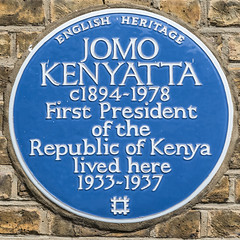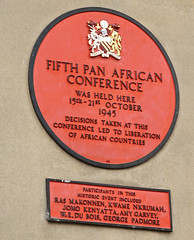Jomo Kenyatta
Commemorated on 2 plaques
Jomo Kenyatta c.1894-1978 first President of the Republic of Kenya lived here 1933-1937
95 Cambridge Street, Westminster, SW1, London, United Kingdom where they lived (1933-1937)
Fifth Pan African Conference was held here 15th - 21st October 1945. Decisions taken at this conference led to liberation of African countries. Participants in this historic event included Ras Makonnen, Kwame Nkrumah, Jomo Kenyatta, Amy Garvey, W.E. Du Bois, George Padmore
Chorlton Town Hall, Chorlton-on-Medlock, Cavendish Street, Manchester, United Kingdom where they participated



